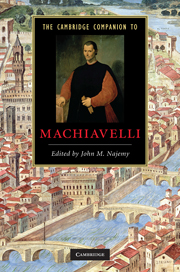Book contents
- Frontmatter
- Introduction
- 1 Niccolò Machiavelli: a portrait
- 2 Machiavelli in the chancery
- 3 Machiavelli, Piero Soderini, and the republic of 1494-1512
- 4 Machiavelli and the Medici
- 5 Machiavelli’s Prince in the epic tradition
- 6 Society, class, and state in Machiavelli’s Discourses on Livy
- 7 Machiavelli’s military project and the Art of War
- 8 Machiavelli’s Florentine Histories
- 9 Machiavelli and Rome: the republic as ideal and as history
- 10 Philosophy and religion in Machiavelli
- 11 Rhetoric and ethics in Machiavelli
- 12 Machiavelli and poetry
- 13 Comedian, tragedian: Machiavelli and traditions of Renaissance theater
- 14 Machiavelli and gender
- 15 Machiavelli’s afterlife and reputation to the eighteenth century
- 16 Machiavelli in political thought from the age of revolutions to the present
- Index
5 - Machiavelli’s Prince in the epic tradition
Published online by Cambridge University Press: 28 September 2010
- Frontmatter
- Introduction
- 1 Niccolò Machiavelli: a portrait
- 2 Machiavelli in the chancery
- 3 Machiavelli, Piero Soderini, and the republic of 1494-1512
- 4 Machiavelli and the Medici
- 5 Machiavelli’s Prince in the epic tradition
- 6 Society, class, and state in Machiavelli’s Discourses on Livy
- 7 Machiavelli’s military project and the Art of War
- 8 Machiavelli’s Florentine Histories
- 9 Machiavelli and Rome: the republic as ideal and as history
- 10 Philosophy and religion in Machiavelli
- 11 Rhetoric and ethics in Machiavelli
- 12 Machiavelli and poetry
- 13 Comedian, tragedian: Machiavelli and traditions of Renaissance theater
- 14 Machiavelli and gender
- 15 Machiavelli’s afterlife and reputation to the eighteenth century
- 16 Machiavelli in political thought from the age of revolutions to the present
- Index
Summary
“He who builds on the people builds on mud”: Machiavelli cites this saying in The Prince (9.272) only to refute it by arguing that the people, if properly managed, will provide a more secure foundation for the Prince's state than fortresses or allies or mercenaries. This important moment in Machiavelli's work does more than elevate the people as well as the Prince who rules them; it also focuses on what must be considered perhaps the key metaphor in the book defining the Prince's activities: he “makes foundations [fare fondamenti].” Machiavelli repeats some version of this notion dozens of times in the relatively short text of The Prince, encouraging the reader to see the Prince as a cross between an architect and a mason, and illustrating the thesis, argued long ago by Jacob Burckhardt in his classic Civilization of the Renaissance in Italy (1860), namely, that people in the period saw the state as a work of art. That Machiavelli should focus on foundations is not surprising since the Prince he describes is “new”: he does not inherit a state, but is faced with the challenge of creating one. Machiavelli is thinking of such “new” princes as Hieron of Syracuse, who rose up through the ranks of the army to seize control of Syracuse; the mythical Theseus, who founded Athens; and, perhaps the most memorable of them all, Cesare Borgia, who attempted, but failed, to create an enduring state in Italy. Even established rulers who already possess states, such as Ferdinand of Aragon, can be “new” (21.291), in this case because he is new to those portions of his realm he acquired after his marriage to Isabella of Castile. “New” princes must, of course, begin at the beginning: before they can build a state, they must make its foundations.
- Type
- Chapter
- Information
- The Cambridge Companion to Machiavelli , pp. 80 - 95Publisher: Cambridge University PressPrint publication year: 2010
- 2
- Cited by



